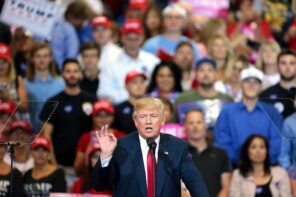Since 2008, ScienceDebate.org has asked presidential candidates to answer a series of question about—good guess!—science. The prompts touch on everything from vaccination to climate change to the state of STEM education in the United States. Yesterday, the organization released responses from Hillary Clinton, Donald Trump, and Green Party candidate Jill Stein (Gary Johnson, the Libertarian candidate, has yet to respond).
The Cubit read the document so you don’t have to. Here’s what you need to know:
1. Space exploration makes the candidates go gooey. Asked about space, Clinton admits that, as a kid, she wrote to NASA to inquire about becoming an astronaut.
Meanwhile, the Trump campaign grew poetic, declaring that “all humankind benefits from reaching into the stars.” Apparently Mexico will not be called upon to construct a stellar wall, “because space is not the sole property of America.”
2. America has enough money to go to space, but not enough to save Miami. “There is still much that needs to be investigated in the field of ‘climate change,'” the Trump campaign wrote. Then things got weirder.
“Perhaps the best use of our limited financial resources should be in dealing with making sure that every person in the world has clean water,” Trump continued, talking about something that has little to do with climate change. “Perhaps we should focus on eliminating lingering diseases around the world like malaria. Perhaps we should focus on efforts to increase food production to keep pace with an ever-growing world population.”
Perhaps, indeed! Perhaps.
3. Clinton’s answer on climate change could not have been more technocratic. Clinton said that climate change is real and dangerous. She offered concrete policy recommendations, too. It’s better to have policy than flair (perhaps), but it was striking that the candidate left out the entire moral dimension of climate change—for example, that a warming world will disproportionately affect the poor, even as it was disproportionately caused by the rich; and that millions may die or be displaced. Or, for that matter, that each and every one of the problems outlined in Trump’s response is deeply impacted by climate change.
4. What on earth is Donald Trump planning for our national parks? The federal government controls enormous amounts of territory, especially out West. Locals are sometimes upset that a distant bureaucracy makes decisions about the land in their backyards. That distress is understandable. But Trump’s response, is, well…actually, we’re not sure what it is. But it looks dramatic. Here’s the key quote: “In a Trump administration, there will be shared governance of our public lands and we will empower state and local governments to protect our wildlife and fisheries.”
In keeping with the GOP platform, the campaign might be suggesting that they’ll gut the federal agencies that protect national parks, national forests, and other public lands, and that uphold a whole American national-spiritual ethos.
5. Jill Stein has gotten savvier on vaccines. As we wrote last month, Jill Stein has made some clumsy concessions to the anti-vaxxer crowd. Asked about vaccines this time around, Stein was more direct in her support, and she reiterated the one good point that she’s been making all along, which is that a lack of public trust in medical authorities is a serious problem, and one that’s not entirely the public’s fault.
Stein is still going after genetically modified organisms, though. ScienceDebate.org didn’t ask about GMOs, but Stein managed to bring up her support for a moratorium on GMOs anyway. Twice!
6. What’s the deal with Trump and clean water? When asked “what steps will you take to ensure access to clean water for all Americans?” Trump did not hedge. “This may be the most important issue we face as a nation for the next generation,” his answer began. Fresh water access is important, and our national system has flaws—just ask the people of Flint—but, well, really? The candidate who wants to dismantle the EPA and rescind the Clean Water Rule?
7. It’s the economy, stupid. In theory, the ScienceDebate.org questions were about “America’s top 20 science, engineering, tech, health & environmental issues in 2016.” But in the end, most of them seemed to boil down to one of two themes: death or money.
That’s not surprising. In the political arena, science remains the great potential optimizer. If you think of politics as the struggle for slices of the giant Resource-and-Value Pie, then a scientific breakthrough can seem like one of the few ways to suddenly, dramatically make the pie much bigger.
As Clinton put it: “Science will ensure that our country continues to progress, and will help our government use its resources to provide the best possible life for all Americans.”
8. This all felt horribly irrelevant. Call it moral bandwidth: as a country, we can only deal with so much at one time. One of the silent consequences of Trump’s campaign has been a narrowing of the national conversation (whatever exactly that means) to a few desperate issues. ScienceDebate.org asked questions about forces that will affect the basic well-being and survival of the United States’ citizenry. In theory, that’s the stuff of democracy. Not one of them, though, felt like something that will even remotely sway the election.





